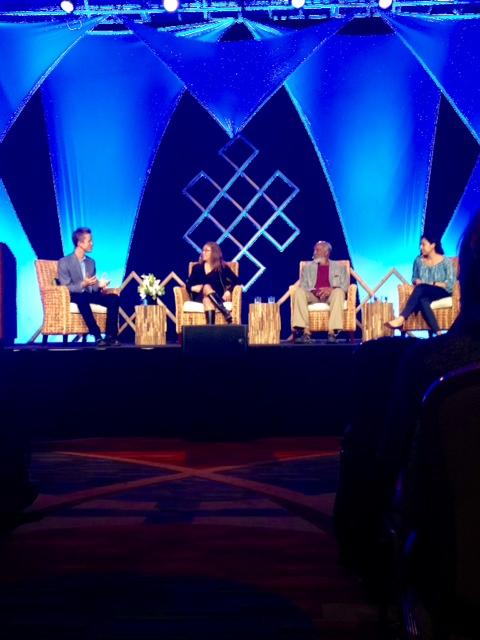
by Haas Institute Communications Fellow Sara Grossman
Speaking to an audience of more than 2,000 in San Francisco, Haas Institute Director john a. powell underscored the importance of fostering a society that places greater value on mindfulness and empathy, as well the necessity of widening our “circle of concern” to one in which all humans belong.
After all, he said, diversity and respect benefits us all.
powell’s audience was perhaps best positioned to achieve those ends, as they were representing a wide cross-section of technology and business leaders who wield significant influence in Silicon Valley and beyond. These leaders were attending the 6th annual Wisdom 2.0 summit, a national conference that aims to address the question of how we can not only live connectected to one another through technology, but how we can do so in ways that are beneficial to our own well-being, effective in our work, and useful to the world. The conference, held Feb. 27-March 1, featured workshops on a variety of topics related to mindfulness and modern life, including mindfulness, justice & community healing, creating a conscious business, and the power of face-to-face interaction in digital culture.
powell, who is also a professor of Law, African American and Ethnic Studies at UC Berkeley, was speaking on a panel entitled “Expanding the Conversation: Inclusivity and Diversity in Tech and Society,” and was joined in conversation by Nancy Lee, director of Diversity & Inclusion at Google, Laura Powers, co-founder and CEO of Code2040, and Soren Gordhamer, founder of Wisdom 2.0.
“The modern-day notion of whiteness is new,” powell told the audience. “Prior to that identity was tied to nationality, like Irish American, German American, etc. What suburbanization did was lump these different groups together.”
The result, he concluded, was a loss of nationality-based identity and a rise in a general white identity. We need to start looking at what we are doing to construct the self and how can we avoid dominating each other, he said.
powell went on to discuss the ways in which bias can play out in the workplace and society at large, noting that most of our biases are unconscious — even people who consciously value racial or other forms of equality can act and make decisions based on biases without even being aware that they have any biases at all.
“As our country is becoming more diverse, we are also becoming more anxious. We all have blind spots in our perspectives,” powell said. “Working in diverse teams ensures that we all don't have the same blind spot. Have relationships with different people. It will change who you are.”
Powers, a co-speaker on the panel, suggested that those relationships might be inevitable, noting that the workforce will be majority people of color in 2040. “White men can absolutely be inclusive, even if their walking into a room doesn't make it more diverse,” she said. Powers later offered some advice to members of the audience. “Be mindful of the space you are in.”
Lee emphasized the importance of conscious awareness in inclusion, saying that mindfulness creates a space to help us become more compassionate. “We surround ourselves with people who make us feel comfortable,” she said, later noting that a “necessary corollary to diversity is inclusion.”
Society needs to actively acknowledge power differentials, powell concluded. “[We must] be deliberate in how we relate to each other,” he said. “How do you create a society where no one is Othered?”




